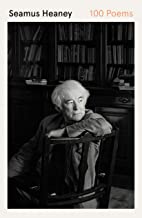One Hundred Poems by Seamus Heaney 2018
When Heaney died in 2013at the age of 74 in Dublin, he was acclaimed as the greatest Irish poet since Yeats and one of the greatest poets of our time. Born into an Irish Catholic family in rural, Protestant, British Northern Ireland, he wrote about family, the Troubles, and nature in an unusual combination of formal poetic forms and also in language that appealed to the general reader. Much-honored in his lifetime, he was named the Nobel Laureate for Literature in 1995 for his ‘works of lyrical beauty which exalt everyday miracles and the living past.’ The Boylston Professor of Poetry at Harvard from 1981-1997 and the Ralph Waldo Emerson Poet in Residence there from 1998-2006, he was also the Oxford professor of Poetry from 1989-1994 and received honorary degrees from many universities, prominent among them, Emory where he left his papers. A stroke limited his work after 2006 though he continued to publish poetry until his death. His final poem ‘In Time’, a love letter to his granddaughter Siofra, was written two weeks before he died and appeared five months later in The New Yorker.
I had read two volumes of Heaney’s work (‘Death of a Naturalist’, his first book of poems from 1966 and his translation of ‘Beowulf’) when I came across this slim volume in a used bookstore in New Hampshire. It’s a compilation of 100 poems chosen by his widow, daughter, and two sons from the nearly 50 years of his poetry. In his daughter’s words in the Family Note that introduces the works, the poems represent ‘many of his best-loved and most celebrated poems, as well as others that were among his favourites to read and which conjure up that much-missed voice. However we also made some choices that have special resonance for us individually: evocations of departed friends, remembered moments from a long-ago holiday; familiar objects from our family home….This collection is intended as a celebration of the extraordinary person who gave us these poems. He himself once said that he had begun to think of life as a ‘series of ripples widening out from an original centre.”
I’d urge you, whether you’re a poetry lover or live in fear of the rhymes, stanzas, and references of the form, read this lovely volume. Heaney’s love of the natural world, his native Ireland, his family and friends, and the memories and experiences of his own life will provide you with moments of pleasure, sadness, memory (‘Treasure Island’s” Jim Hawkins and the Aeneid’s volume VI make cameo appearances), and that sudden jolt of recognition that great poetry provides when you say “I never thought of it or saw it in that way”. I deeply regret that while Heaney and I lived in Cambridge, MA at the same time for some years, I never saw him or heard him read. Another opportunity lost to time.



